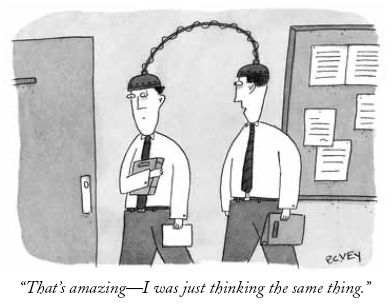

Some quick notes about the craniometry article, and thinking ahead to the video, Race, Power of an Illusion
Who :
This article is by Professor Jay Gould, reflecting back on the early science of 19th century France. He studies the work of Paul Broca, an esteemed French surgeon, who conducted studies in craniometry, the measurement and analysis of skull size.
Broca's study , as Gould describes it, was "trying to measure 'with scientific certitude' the inferiority of women" (43) In short, he believed that women had smaller brains, which explained their intellectual inferiority. And the numbers he collected, the heads he measured, did indeed show that women on average had smaller brains.
And a century and a half later, Gould notes that Broca's numbers were indeed pretty solid. So what's up with that?
There are two main points here:
One is easy, and that's a critique of early science. Gould points to several major flaws in Broca's methodology that influenced his findings - and science is only as good as its method, right? These flaws include:
 So one point here is that science has gotten more sophisticated, and that what was considered a good methodology then, doesn't quite hold up now. What we call "scientific fact" now may well be proven wrong next week.
So one point here is that science has gotten more sophisticated, and that what was considered a good methodology then, doesn't quite hold up now. What we call "scientific fact" now may well be proven wrong next week.
BUT that's actually aside from the main point of the article, which is about Broca's claim to objectivity and the 'fact' that he proved women's inferiority. Gould writes:
"Broca depicted himself as an apostle of objectivity, a man who bowed before facts and cast aside superstition and sentimentality. He declared that 'there is no faith, however respectable, no interest, however legitimate, which must not accommodate itself to the progress of human knowledge and bend before truth.' Women, like it or not, had smaller brains than men and, therefore, could not equal them in intelligence. This fact, Broca argued, may reinforce a common prejudice in male society, but it is also a scientific truth. (Gould, 43)
Broca thought he proved objectively that women are inferior. And that's what Gould questions - after reviewing the data, he says "I find his numbers sound but his interpretation ill-founded, to say the least."
Again, Gould found that Broca's measurements alone were pretty good. But, Gould says, "science is an inferential exercise, not a catalog of facts. Numbers, by themselves, specify nothing. All depends upon what you do with them" (43)
That is, Gould says Broca's interpretation of the 'facts' was the most flawed of all.
--What do you mean, interpretation? Numbers are just numbers, aren't they?
Well, Gould says, let's look at what Broca said when a colleague suggested that women's brains are smaller simply because women's bodies tend to be smaller.
Broca writes:
We might ask if the small size of the female brain depends exclusively upon the small size of her body.... But we must not forget that women are, on the average, a little less intelligent than men, a difference which we should not exaggerate but which is, nonetheless, real. We are therefore permitted to suppose that the relatively small size of the female brain depends in part upon her physical inferiority and in part upon her intellectual inferiority. (44)
So Broca was ASSUMING that women are "on the average, a little less intelligent than men." That was an underlying assumption of the entire study....which means that his conclusion (women are less intelligent than men) was also the starting basis for the study.
A bit circular, no? That's called an a priori assumption - when you're trying to prove something you already take for granted. It means you're setting yourself to find or 'prove' exactly what you want. It's a pretty big stumbling block.
It's sort of like saying ... "I'm going to study why A + B = D"
Instead of ..... "I'm going to study the sum of A + B"
Does this mean that Broca was a lousy scientist? On the contrary, he was a leading scientist of the ninettenth century. It does show, however, that he was a product of his times, and even Gould confirmed that his numbers alone were pretty good. It was his interpretation of those numbers that he was committed a priori to understanding -- that they proved women's inferiority rather than their small body size or that their older sick brains were smaller or a dozen other possible interpretations.
 And more importantly, it shows that even the most careful, conscientious scientist may be unaware of biases that he or she brings to their scientific work. This example is easy to see in retrospect - how could Broca not see that? Well, he didn't see it because it was absolutely unremarkable, a common idea circulating in his society at the time. He was no more immune from the prejudices of his time than anyone else.
And more importantly, it shows that even the most careful, conscientious scientist may be unaware of biases that he or she brings to their scientific work. This example is easy to see in retrospect - how could Broca not see that? Well, he didn't see it because it was absolutely unremarkable, a common idea circulating in his society at the time. He was no more immune from the prejudices of his time than anyone else.
So we have to ask, similarly, what kinds of bias may be operating in science today that we just don't see?
Lots of studies claim to show that women are naturally inferior to men in math skills, for example. Is it possible that many of these studies are carrying the same kinds of assumptions that Broca did?
Okay, this is Gould's argument. Why am we including it here? You will see a similar argument  put forth in this video by a guy named Hoffman in the late 1880s- only he brings an a priori assumption about the inferiority of black people. And he writes a best-selling book (Race Traits & Tendencies of the American Negro) that "proves" the same thing. The movie will walk you through the critique.
put forth in this video by a guy named Hoffman in the late 1880s- only he brings an a priori assumption about the inferiority of black people. And he writes a best-selling book (Race Traits & Tendencies of the American Negro) that "proves" the same thing. The movie will walk you through the critique.
For now, just think about science -- is it immune from the culture in which it operates? Are scientists truly objective?
Oh, by the way, when Broca died, they measured his brain. Turns out it was very small. ;-)